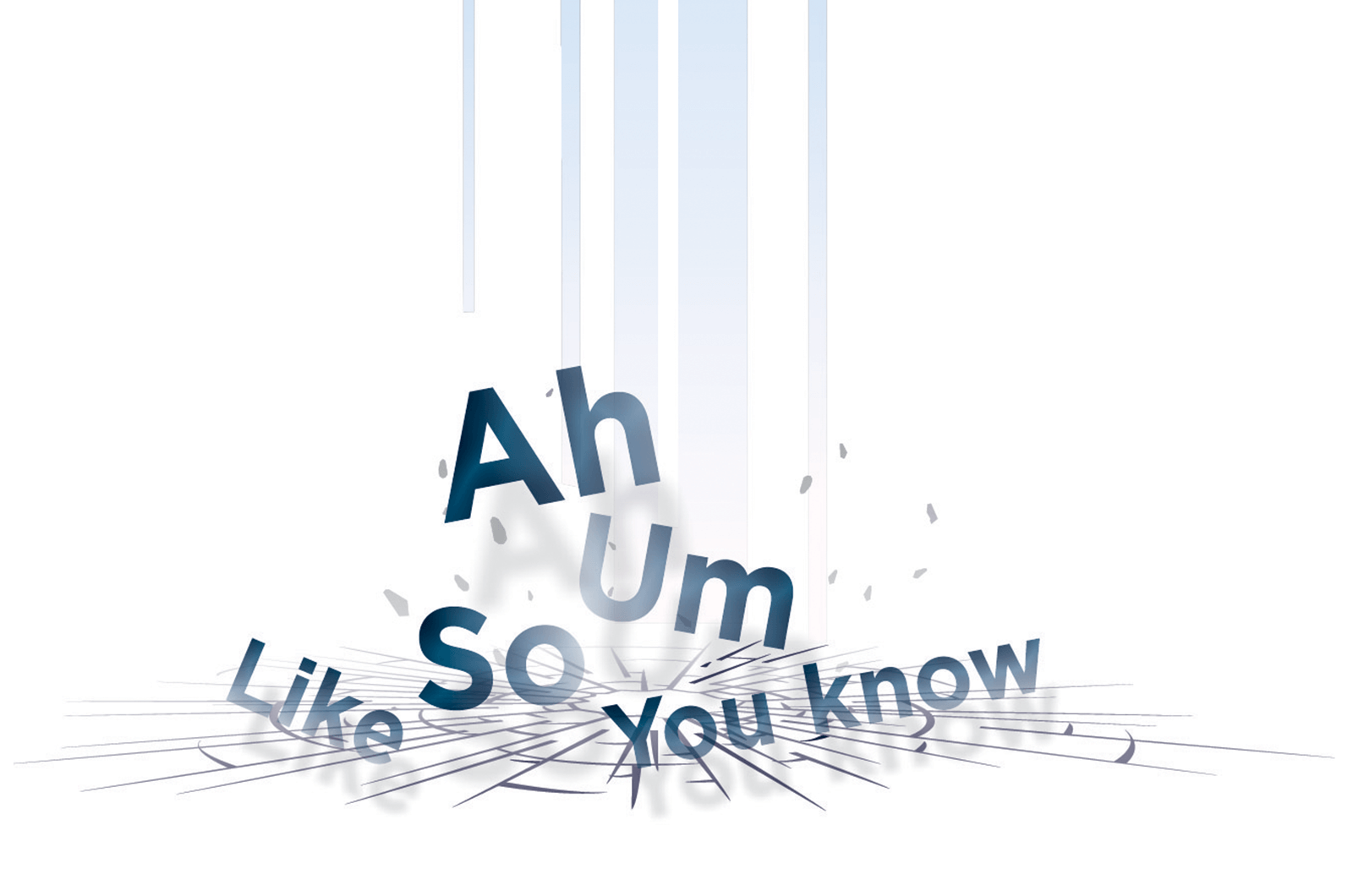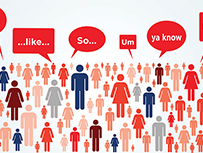
A client I work with frequently is a very strong speaker—she’s confident, powerful and very aware of her message. Yet, even with all that ability, she makes one mistake consistently and is mostly unaware of it.
She begins nearly every sentence with the word “so.”
“So, I thought we’d start by … ”
“So, I’d like to thank … ”
“So, my answer to that is … ”
“So” is her “crutch word,” a term we Toastmasters are very familiar with. In every meeting, the Ah-Counter is tasked with identifying, and delivering a report on, “overused words or filler sounds used as a crutch by anyone who speaks during the meeting.”
These include words such as “and,” “well,” “but,” “so” and “you know,” but also mere sounds like “ah,” “um” and “er.” Sometimes they include words such as “literally,” “actually” and “basically.” Whatever form they take, crutch words typically have two attributes: 1) overuse, and 2) meaninglessness.
Crutch words are never necessary and may even get in the way of you making your point.
Why Do We Use Crutch Words?
Theories abound about why people use crutch words. In an article for The Atlantic, Jen Doll suggested we use them to “give us time to think, to accentuate our meaning (even when we do so mistakenly), or just because these are the words that have somehow lodged in our brains and come out on our tongues.”
In a widely-shared Harvard Business Review article, Noah Zandan suggests that filler words come in handy when a speaker is “nervous, distracted or at a loss for what comes next … These may give us a moment to collect our thoughts before we press on.”
I personally believe words such as “um” and “ah” emerge when our brain anticipates a void or an uncertain moment in our presentation and basically freaks out, quickly plugging the hole with a pointless sound.
It takes a lot of confidence to start a speech with a strong first word, so speakers sometimes start with “so” or “OK” as a way of easing into a talk, which may seem less intimidating.
In both cases—and regardless of the cause—the “fix” is unacceptable. Any part of your speech that doesn’t support your point will take away from it, even if in little pieces. And you always want to make sense, never nonsense.
How to Overcome Crutch Words
If you don’t have an Ah-Counter handy, many digital apps now exist to help you discover and count your crutch words (the LikeSo app is one example). But simply knowing and counting your crutches may not be enough. For many, using filler words is so routine and reflexive that asking them to stop saying “ah” or “um” by counting them is like asking someone to control his sneezing by having him count his sneezes.
The trick to controlling this habit is substituting another behavior in its place, or at least adopting tactics that reduce its frequency. In my experience, these four strategies can help.
1 Embrace the Pause
Most public-speaking experts agree that the best replacement for a crutch word is a deliberate pause. Whereas filler words create distraction, pauses have multiple benefits: They create suspense, slow down fast talkers, demonstrate confidence, draw audience attention and give speakers the time they need to communicate with precision.
Knowing these benefits, speakers should deliberately pause when they feel a crutch word coming on. It may feel awkward at first, but with practice, you will soon be pausing instead of using crutch words, and there’s no penalty for pausing. Audiences rarely say, “That was a good presentation, but she paused too much.” Like your sophomore year of high school, pauses are so uneventful that they are quickly forgotten.
2 Slow Down
Speakers often use filler words because their mouths are outpacing their minds. Words are coming out erratically and nonsensically before the brain has a chance to organize them into points. But when speakers slow down, they have much more time to plan out the precise phrases they want to use and will not need nonsensical fillers to connect random and pre-baked thoughts.
If you have trouble slowing down naturally, insert more deliberate pauses and raise your volume; both are countermeasures to fast talking. As a naturally fast talker myself, it’s useless to tell myself, Go slower! But raising my volume and adding more pauses are much more actionable and effective.
3 Know Your Point
When speakers don’t have clear points, they’re inclined to ramble. Crutch words are then generated to connect these rambling sentences and ideas (“and, um ... so … ”). But if speakers prepare their points in advance and know them well, they’re able to start them efficiently and wrap up once they’ve successfully delivered them, making rambling and desperate connections less necessary. After all, if you start talking before you know what you want to say, you’re bound to say something pointless.
4 Practice
When you’re nervous and anxious, saying anything—even a crutch word—may feel more comfortable than saying nothing. Practicing mitigates that anxiety by making the speaker more familiar with the material. A comfortable and confident speaker has more control, enabling her to embrace pauses and deftly avoid the “ums” and “ahs.” Practice may not always make perfect, but it can give you the confidence to make good public-speaking decisions.
Crutch words are not an indication of your experience or ability. Some executives use crutch words all the time, while some interns never do. But if you know what your problem words are and learn to control them, you’ll be a clearer and more efficient point-maker, and that’s always a goal worth aiming for.
Are you looking for a way to keep track of ‘ahs’ and ‘ums’ at your next Toastmasters meeting? Learn about the Toastmasters mobile app for Ah-Counters in this video:
Joel Schwartzberg is a presentation coach, executive communication specialist, and author of The Language of Leadership: How to Engage and Inspire Your Team and Get to the Point! Sharpen, Simplify, and Sell Your Message. Follow him on LinkedIn.
Related Articles

Presentation Skills
Um, How Do I Stop, Ya Know, Using Um and Ah?

Personal Growth



 Previous
Previous
 3 Ways to Make Ah-Counting Count For More
3 Ways to Make Ah-Counting Count For More
 Previous Article
Previous Article